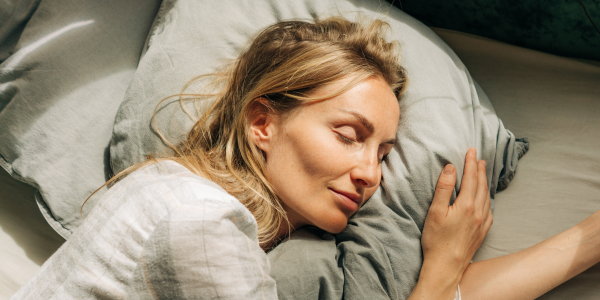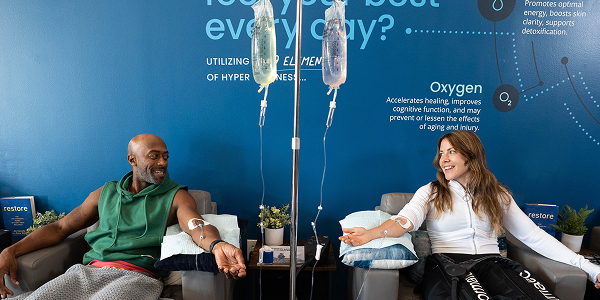If you find it difficult to get the recommended 7 or more hours of sleep every night, you’re not alone. It’s estimated that more than 50 million Americans suffer from an ongoing sleep disorder, and poor sleep can increase a person’s chances of negative health consequences ranging from poor cognitive performance and mood, weakened immunity and cardiovascular disease to diabetes and obesity.
Lack of quality sleep can affect all aspects of your life, but there are simple tips to improve your sleep, and in turn, your overall health and well-being.
Establish a Sleep Routine
A study from Applied Physiology, Nutrition, and Metabolism found that both going to bed later and greater variability in sleep are associated with adverse health outcomes. When possible, try to go to bed and get up at the same time every day, which can help to regulate your body’s circadian rhythm.
Disconnect from Devices at Night
While it's tempting to scroll through your phone late at night, aim to turn off all electronic devices at least 60 minutes before bed. Not only does the additional stimulation keep you awake, but those devices emit blue light, which reduces the hormones responsible for relaxation and sleep.
Add Red Light Therapy to Your Routine
Not all light is bad. In fact, regular use of non-invasive Red Light Therapy has been found to both improve sleep quality and prevent sleep disorders. Red Light Therapy exposes the skin to low levels of red or near-infrared light, which may help improve circulation, reduce pain and inflammation and support cellular regeneration. When the body can more effectively repair and recover throughout the night, this can help foster more restful sleep.

Keep Naps Short and Sweet
Taking more than a quick power nap can do more harm than good, as it disrupts the body’s circadian rhythm and makes it harder to sleep at night. It’s recommended to limit naps to no more than 20 minutes.
Limit Caffeine in the Afternoon
Caffeine is a stimulant, and a study from Sleep Medicine Reviews warns that consuming caffeine in the afternoon can reduce the total time you sleep by 45 minutes and sleep efficiency by 7%. They recommend no caffeinated beverages at least 8 hours before you plan to sleep, and no caffeine stimulants 13 hours before bed.
Get at Least 30 Minutes of Natural Light Exposure
The body’s circadian rhythm is also affected by natural sunlight and exposure to bright light, and the Journal of Biological Rhythms found that “high environmental light intensity” increases both the duration and quality of sleep. An additional study concluded positive effects on sleep could be felt with as little as 30 minutes of light exposure.

Implement Regular Cryotherapy
Cryotherapy is a science-backed treatment that exposes the entire body to sub-zero temperatures for up to 3 minutes, which can reduce oxidative stress and inflammation, improve blood flow and improve mood. Recent research has also correlated that Cryotherapy may enhance sleep quality, duration and slow-wave sleep—which is essential for both physical and mental repair.
Consider Melatonin Supplements
Melatonin is a hormone responsible for the sleep-wake cycles, telling your body when it’s time to wind down and get to bed. When combined with other sleep practices, the use of natural supplements like melatonin may help promote better sleep.
Limit Alcohol Consumption
Alcohol not only alters the nighttime production of that melatonin, but it also increases symptoms of sleep disorders like sleep apnea, snoring and disrupted sleep. That doesn’t mean a glass of wine once in a while is prohibited, but you should be mindful of how it may negatively affect your sleep.
Invest in Quality Bedding
How old is your mattress? It’s recommended that you replace your mattress every six to eight years, and it’s essential that the mattress you choose provides both comfort and support. Sleep quality has also been found to be directly affected by both sleepwear and bedding materials, so take the time to do research about the best bed accessories for your situation.
Create a Comfortable Environment
Along with a comfortable bed, you have to have a comfortable sleep environment. This means keeping it a comfortable temperature (65℉ is the recommendation) ensuring proper ventilation and reducing outside noise and light.
Plan Exercise Accordingly
It’s been scientifically proven that regular exercise can help improve both sleep and overall health. But timing is everything, as strenuous exercise two to three hours before bedtime may negatively affect sleep due to the fact it stimulates certain hormones responsible for energy and alertness.
Avoid Nicotine
The numerous negative health effects of nicotine are well-documented, and you can add a reduction in sleep duration and quality to that list. Nicotine is a stimulant, and even second-hand smoke exposure can lead to poor quality sleep.
Take Time to Relax
Things like practicing gentle yoga, taking a hot bath, listening to music and meditating help the body and mind unwind and relax, preparing it for restful sleep. Find what works best for you, and try to reserve time at the end of the night for relaxation.
.jpeg)
Avoid Large Evening Meals
Eating too much in the last couple of hours before bed can have negative impacts on quality sleep—as do the foods that you choose to eat at night. Avoid spicy or sugary foods, and choose things like turkey, fatty fish, nuts and fiber-rich snacks like oatmeal and bananas.
Limit Liquids at Night
Hydration is important for overall health, but limit liquid consumption in the evening so you can limit “nocturia”—the scientific name for excessive urination at night—which negatively impacts both the duration and quality of sleep.
Keep the Bedroom a Sleep-Only Zone
It’s important to create a bedroom that your mind will associate with only sleep and sexual activity, which can help foster an emotional reaction of relaxation and restoration. This means no working from your bed, exercise bikes in the corner or electronic devices that might expose you to stimulation that keeps you up instead of helping you wind down.
Incorporate Mild Hyperbaric Oxygen Therapy
It’s been shown that oxygen therapy can have a profound effect on sleep, and one form to consider is Mild Hyperbaric Oxygen Therapy (mHbOT). This innovative treatment involves immersing individuals in a pressurized hyperbaric chamber where they can breathe 90-95% pure oxygen, compared to the 21% oxygen content of regular air. This optimized oxygen supply throughout the body may promote not just better sleep and relaxation, but also healing, recovery and regulation of the nervous and immune systems.
Ready to get a healthy night’s sleep?
An improved sleep routine can lead to overall improved health and well-being. Through a variety of lifestyle adjustments and the inclusion of innovative treatments like Cryotherapy, Red Light Therapy and mHbOT, you have the tools in your arsenal to build a sleep practice that leaves you rested, revitalized and restored.
Medical services are provided by an independently-owned physician practice. Some services may require medical clearance and a prescription. We reserve the right to refuse service to anyone. Services, therapies, nutrients and prices may vary per location. The content on our site, blog posts, educational materials, app, promotional newsletters, and any other written content are not intended to replace an evaluation with a qualified healthcare professional and are not intended as medical advice.



.jpg)


